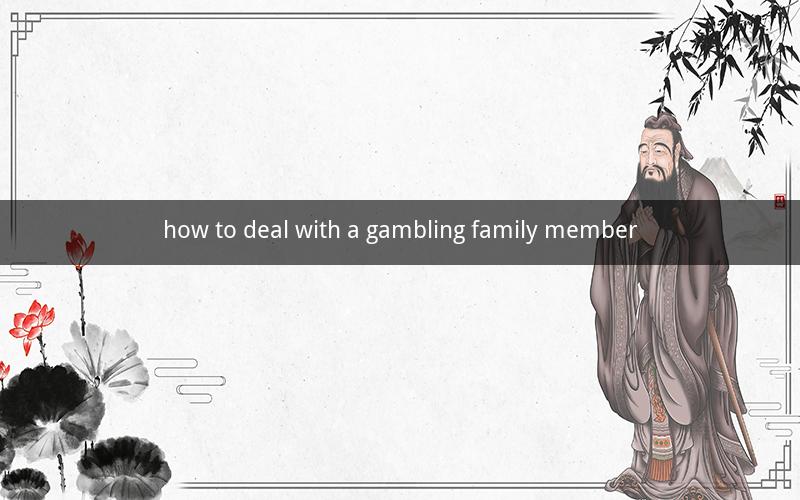
Table of Contents
1. Understanding the Problem
2. Recognizing the Signs
3. Communicating with the Family Member
4. Seeking Professional Help
5. Setting Boundaries
6. Encouraging Support Groups
7. Educating Yourself
8. Taking Care of Yourself
9. Legal and Financial Considerations
10. Long-Term Solutions
1. Understanding the Problem
Dealing with a family member who has a gambling addiction can be challenging. It is crucial to understand the nature of the problem and its impact on the family. Gambling addiction is a progressive disorder that affects both the individual and their loved ones. It is characterized by an inability to control gambling behavior, despite negative consequences.
2. Recognizing the Signs
Identifying the signs of a gambling addiction is the first step in addressing the problem. Some common signs include:
- Secretive behavior
- Missing money or valuable items
- Increasing debts
- Isolation from family and friends
- Changes in mood and behavior
3. Communicating with the Family Member
Open and honest communication is essential in dealing with a gambling family member. Approach the conversation with empathy and understanding, emphasizing your concern for their well-being. Avoid confrontational language and focus on expressing your feelings rather than accusing them of wrongdoing.
4. Seeking Professional Help
Encourage your family member to seek professional help from a therapist or counselor specializing in gambling addiction. Therapy can provide them with the tools and support needed to overcome their addiction.
5. Setting Boundaries
Establish clear boundaries to protect yourself from the negative consequences of your family member's gambling. This may include limiting contact, refusing to lend money, or setting strict rules regarding financial matters.
6. Encouraging Support Groups
Support groups, such as Gamblers Anonymous, can provide your family member with a sense of community and understanding. Encourage them to attend meetings and connect with others who have experienced similar challenges.
7. Educating Yourself
Educate yourself about gambling addiction to better understand the problem and support your family member. Learn about the signs, treatment options, and available resources.
8. Taking Care of Yourself
It is crucial to take care of yourself while dealing with a gambling family member. Seek support from friends, family, or professionals to help you cope with the stress and emotional toll of the situation.
9. Legal and Financial Considerations
If your family member's gambling has resulted in legal or financial problems, it is essential to address these issues promptly. Consult with a lawyer or financial advisor to explore your options and seek guidance.
10. Long-Term Solutions
Developing long-term solutions is crucial to prevent the recurrence of gambling addiction. This may include ongoing therapy, participation in support groups, and implementing strategies to manage stress and avoid triggers.
10 Questions and Answers
1. Q: Can a gambling addiction be cured?
A: While there is no guaranteed cure for gambling addiction, it can be effectively managed with proper treatment and support.
2. Q: How can I help my family member stop gambling?
A: Encourage them to seek professional help, establish boundaries, and provide support through education and empathy.
3. Q: What if my family member refuses to seek help?
A: Continue to offer support and express your concerns, but be prepared to set boundaries to protect yourself from the negative consequences.
4. Q: Can gambling addiction be inherited?
A: While genetics may play a role in the development of gambling addiction, it is not solely determined by inherited factors.
5. Q: How can I support my family member during therapy?
A: Attend therapy sessions with them, provide emotional support, and encourage them to participate in support groups.
6. Q: Can I lend money to my gambling family member?
A: It is generally not advisable to lend money to a gambling addict, as it can exacerbate their addiction and create further financial problems.
7. Q: How can I cope with the stress of dealing with a gambling family member?
A: Seek support from friends, family, or professionals, and engage in stress-reducing activities to maintain your mental and emotional well-being.
8. Q: What are some effective treatment options for gambling addiction?
A: Treatment options include therapy, support groups, medication, and lifestyle changes.
9. Q: How long does it take to recover from a gambling addiction?
A: Recovery from a gambling addiction is a gradual process that can take months or even years. It is essential to remain committed to the treatment plan and support system.
10. Q: Can a gambling addiction lead to other mental health issues?
A: Yes, gambling addiction can co-occur with other mental health issues, such as depression, anxiety, and substance abuse. It is important to address these issues concurrently to ensure a comprehensive recovery.